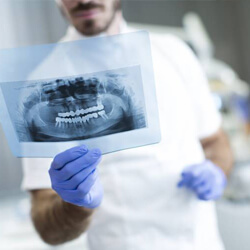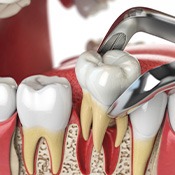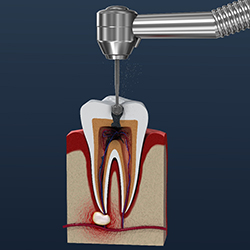Root Canal Therapy – McKinney, TX
Comfortable, Effective Smile Renewal
 As a team that values conservative dentistry, our first plan is always to save a tooth from extraction and keep your smile intact whenever possible. And sometimes, root canal therapy is the best way to do just that. This common restorative procedure can rescue a severely decayed or injured tooth from extraction. Keep reading to learn more about root canal therapy in McKinney, TX.
As a team that values conservative dentistry, our first plan is always to save a tooth from extraction and keep your smile intact whenever possible. And sometimes, root canal therapy is the best way to do just that. This common restorative procedure can rescue a severely decayed or injured tooth from extraction. Keep reading to learn more about root canal therapy in McKinney, TX.
When Is a Root Canal Necessary?
A root canal is necessary when the interior of a tooth has been affected by tooth decay or injury. Your tooth is made up of several layers -- the outer enamel covers up the dentin and the pulp which lives on the very interior of the tooth. If a cavity is not treated, it will eventually eat its way into the pulp. A broken tooth could also leave the pulp exposed. Either way, a root canal will likely be the recommended treatment.
Some of the warning signs that could indicate the need for a root canal include:
- A severe toothache
- Sensitivity to heat, cold, or pressure
- Receding gums
- A darkening tooth
- A foul odor coming from the tooth
What Happens In a Root Canal?

Most root canal procedures are carried out over the course of two visits to our dental office. During the first appointment, the tooth is cleaned out, the root canals are reshaped and sanitized, and a biocompatible material fills the interior. When a second visit is required, the tooth will be measured for a new restoration and a temporary crown or filling will be placed. Then, you return to our dental office after one to two weeks for the permanent restoration.
Root canal therapy has developed the reputation of being very painful -- but that’s actually not so accurate at all. We believe that somewhere along the way, people started confusing the pain of the toothache with the treatment that cures it. The truth is, there is nothing to fear from a modern root canal. Anesthesia and sedation are always on hand to help you fully relax throughout the procedure.
Recovering from a Root Canal

If your root canal procedure is carried out over two visits, you will need to take extra care when eating until your tooth has received the permanent restoration. Avoid sticky and hard foods altogether and try to avoid chewing on that side of the mouth.
Right after the procedure is complete, you will likely experience some mild discomfort, bleeding, and swelling. Plan to take it easy for the rest of the day. Lie with your head elevated and use an ice pack in the first 24 hours after the procedure to minimize swelling. Take any medication exactly as prescribed and do not hesitate to get in touch with us if your symptoms worsen or do not improve after several days.
Understanding the Cost of Root Canals

Now that you know more about what root canals are and why you might need one, it’s natural to wonder how much they cost. You might not pay the same exact amount as someone else because the total can vary from person to person based on your unique circumstances. Continue reading to learn more about the different factors that are considered when determining your invoice, and feel free to contact us with additional questions.
Learn More About the Cost of Dental Emergencies
Factors That Can Affect Root Canal Cost

Because everyone’s situation is different, we can’t give you an estimate until you’ve consulted with one of our dentists. Once you’ve been examined, our team will provide a detailed quote and walk you through the projected expenditures before proceeding.
A few different things can impact the total, including:
- Where the tooth is located. Molars in the back of your mouth are harder to access and have more roots than your front teeth. If additional work, instruments, anesthetics, or sedatives are required, then you’ll be responsible for the added fees.
- Whether other treatments are needed. For example, if we also find signs of gum disease, you’ll have to pay for the additional services to address it.
- How it’s being restored. Typically, we provide a dental crown to protect your tooth and allow you to continue to use it to eat, speak, and smile. The price for your prosthetic can depend on how it’s made, what materials are used, etc.
Is it Cheaper to Pull My Tooth?

It’s not uncommon for patients to wonder if it wouldn’t be easier and more cost-effective to remove their troublesome tooth instead. Although a simple extraction might be less expensive upfront, a surgical extraction can cost more. Furthermore, it’s important to remember that there are long-term consequences to having gaps in your grin. Your jawbone begins to thin without a root to stimulate new bone growth, and in time, it can become too frail to support your remaining teeth or restorations.
Replacing it with a dental implant is the only way to prevent this process of degeneration, and these artificial teeth tend to be pricey. You can save money on a root canal and dental crown than investing in surgical extraction and quality replacement.
Does Dental Insurance Cover Root Canal Treatment?

A root canal is considered a major procedure, which is good news for those with a dental insurance policy. Many programs cover anywhere from 50% to 80% of this type of work once you’ve met your deductible. However, every plan is different, so it’s worth double-checking your details. There may be other restrictions you need to know about, too, like a waiting period that must pass before benefits kick in or a limited number of teeth that are covered.
If you’re struggling to find the information, please let us know. Our friendly office staff is familiar with many types of insurance and can help you maximize your benefits.
Other Options for Making Root Canal Treatment Affordable

Our team understands that not everyone carries dental insurance, and we don’t want your budget to keep you from receiving the care you need for a happy, healthy smile. As a result, we’ve implemented the following programs to help you afford your root canal treatment:
- Flexible Financing. We’ve partnered with CareCredit, a third-party financer that allows you to break down your total fee into more manageable installments if your application is approved.
- In-House Payment Plan. Our team can work with you to make a suitable arrangement so that you can pay for your dental services without breaking the bank. We can spread payments across 24 months or less with little or no added interest.
Root Canal FAQs

Root canals are one of the most misunderstood dental procedures, so if you find yourself nervous about an upcoming procedure, you certainly aren’t alone. Everyone here at Oakbrook Dental & Orthodontics is empathetic toward what our patients are feeling, and we’ll do everything we can to ensure that you’re completely at ease when you’re here.
Until then, it’s natural to have some questions about root canals. Here are some answers that may quell your anxieties until then.
How Long Does a Root Canal Take?
Root canals are often done to address serious toothaches, so we’ll do what we can to alleviate your discomfort as quickly as possible. Root canals are typically completed within a single appointment, but sometimes take two if the infection is severe. This is more likely for molars than for front teeth.
In the case of needing two appointments, the first will usually involve applying antibiotics to the tooth. The second appointment will be the root canal itself, which typically takes anywhere from 30 to 90 minutes to complete.
Are Root Canals Safe During Pregnancy?
If you’re pregnant, you may be a little nervous about how a root canal may affect you. Thankfully, both the American Dental Association and the American Congress of Obstetricians and Gynecologists concur that root canals are safe during pregnancy.
We use sophisticated shielding techniques to protect you during treatment, and the local anesthetics we use also shouldn’t cause any problems for your fetus.
That said, it is generally recommended that you minimize how much medication you consume, which may make antibiotics and pain relief during aftercare problematic. For that reason, it’s recommended that you wait until the second trimester to get dental work, as this is when risks to both you and the fetus are lowest.
Do I Still Need a Root Canal If My Toothache Went Away?
If your toothache is being treated via a root canal, it’s because the cause of your discomfort is an infection. The teeth can’t effectively deal with disease in the way that the rest of the body can, meaning that oral infections don’t fade on their own. Eventually, however, you may stop feeling their effects.
Unfortunately, this is actually a bad sign. It means that the infection has attacked the nerve tissue in the tooth to such an extent that it can no longer function properly. When this happens the tooth is close to dying completely, making the need for a root canal even more pressing.
If we tell you that you need a root canal, you should get it as soon as possible, even if you can no longer feel your tooth.
Are Root Canals Safe?
There are some common myths about root canals, with some people claiming that they increase your risk for cancer or other health conditions. The dental community takes these kinds of claims very seriously, but any concerns about the safety of root canals have been thoroughly discredited.
These claims originate from a study conducted a century ago, and research done since hasn’t been able to replicate these results.
The only thing you have to worry about after a root canal is the potential for infection to persist after the treatment. While uncommon, this isn’t unheard of. If you notice that you experience swollen gums or another toothache after a root canal, you contact us immediately for a follow-up exam.
Contact Us Today!
Are you dealing with an aching or damaged tooth? Don’t hesitate to get in touch with our dental office! With comfortable and effective root canal therapy, we can have you out of pain and on with your life before you know it. We invite you to contact us to schedule an appointment today.

